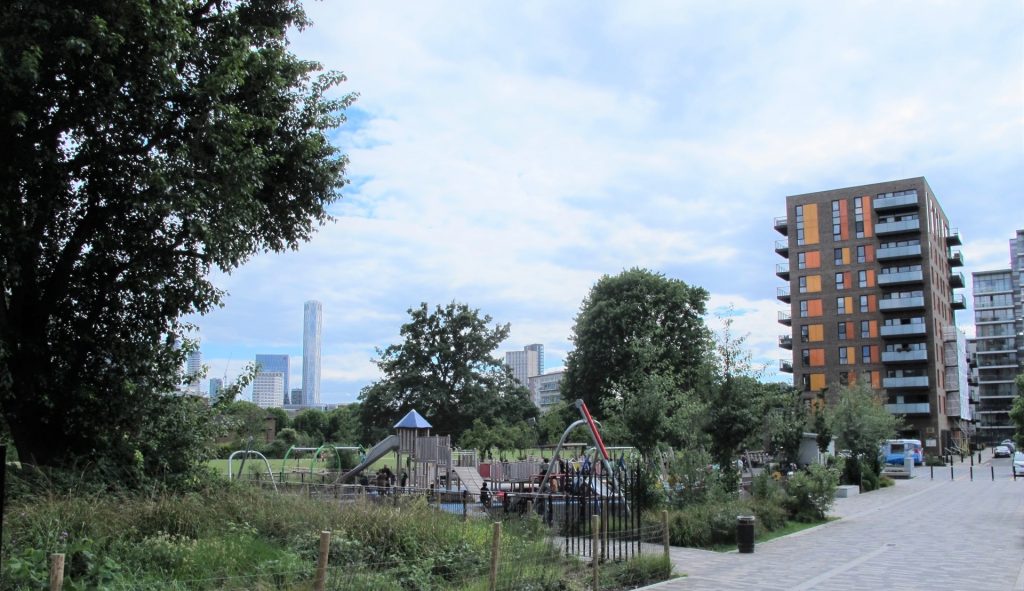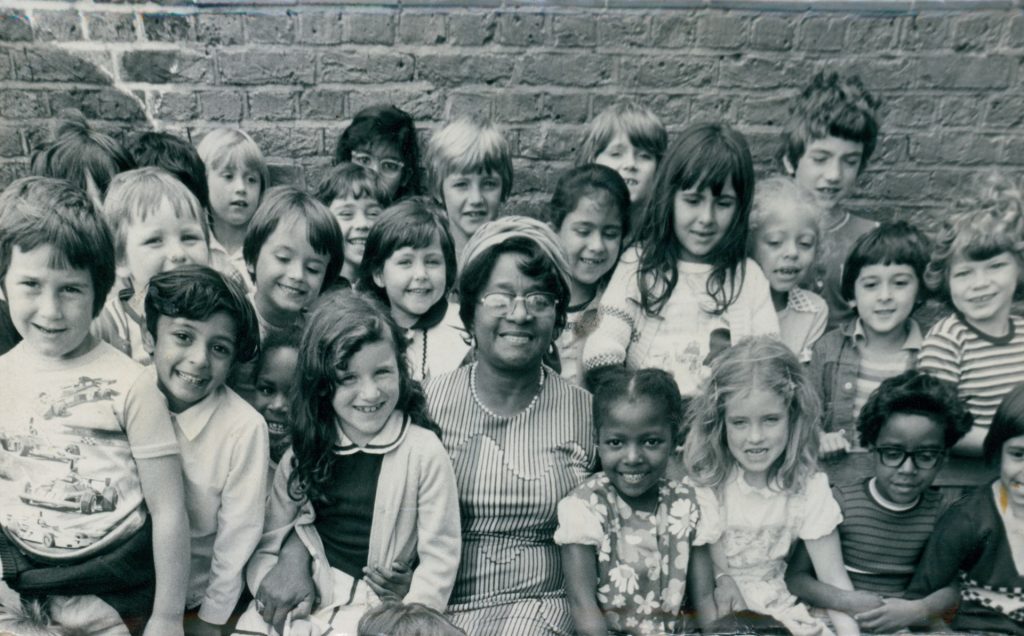IOE at 120: how philosophy of education addressed ideas and values at the heart of the debate – 1962–1972
By Blog Editor, IOE Digital, on 28 July 2022

Progressive educational ideas and practice were highly influential : ‘child-centred’ primary classroom in the 1960s
28 July 2022
This blog is the seventh in a series of 12 exploring each decade in IOE’s history in the context of the education and society of the times. Find out more about our 120th anniversary celebrations on our website, and follow us on Twitter, Instagram, Facebook and LinkedIn to keep up with everything that’s happening.
John Dewey argued that philosophy could be understood as “the general theory of education”, and philosophy has always played a central role in teaching and research at IOE. Indeed, IOE is regarded as one of the leading centres for Philosophy of Education in the world.
The decade from 1962-1971 is often regarded as the heyday of British philosophy of education, when what came to be known as ‘the London school’ was crystalised at IOE. This was a period when teacher training courses included lectures and seminars in the ‘foundation disciplines’ of Read the rest of this entry »
Belonging, part 5: Young people are put in our path to teach us new lessons
By Blog Editor, IOE Digital, on 27 July 2022

Jubilee performance by children at Cremer Randall Primary, Hackney
27 July 2022
The guests at the best bug hotels – I learn from my five-year-old granddaughter – can be ladybirds, beetles, even butterflies. While this is not my vision of luxury hotel living, her tutorial reminds me that young people are put in our path to teach us new lessons, and to remind us of what we may have long forgotten.
This blog – the last in a series of five about Belonging – was inspired by a recent visit to a school in Hackney – Cremer Randall Primary. My aim in visiting the school was to gather material for the final instalment of the podcast series, Let’s hear it for School Belonging. This is a story of possibilities told by young people, school leaders and experts from around the world, with insights from Rapper Jamie Pyke.
I have known the headteacher of Cremer, Jo Riley (no relation), for some time. She is one of the 16 headteachers I worked with during the Covid-19 Pandemic. I learned much from her and her peers about the importance of ‘compassion’ which contributed to my thinking in Compassionate Leadership for School Belonging. You can download this book for free – a Read the rest of this entry »
Belonging part 4: Zero tolerance or compassion – which way is school leadership heading?
By Blog Editor, IOE Digital, on 20 July 2022

Pupils from Flakefleet Primary audition for Britain’s Got Talent, with headteacher Dave McPartlin in the background (screenshot)
20 July 2022
If you want a few moments of unbridled joy, watch Flakefleet Primary School, Fleetwood perform their 2019 audition for ‘Britain’s Got Talent’. Next, dip into Michele Obama’s autobiography Becoming and find out about one of her favourite schools, Elizabeth Garret Anderson (EGA), and why it ‘touched her heart’ (p.320). This exploration will give you some insights into the leadership of Flakefleet and EGA.
Scanning the leadership terrain of late, I have been trying to make sense of what is going on. Two widely different models of school leadership seem to be emerging at opposite ends of the spectrum. One is relational and compassionate and focused on belonging; the other is about command and control, with ‘zero tolerance’ of misdemeanours. Each approach reflects a different view about what motivates people in an organisation. Broadly speaking these are that people want to contribute and be part of an enterprise versus that they are unwilling to deliver and need to be closely supervised.
In the Podcast Zero tolerance or a sense of us we brought together the headteachers of Flakefleet Primary and EGA (Dave McPartlin and Jo Dibb) to talk about their leadership. The conversation is electric. Read the rest of this entry »
Belonging part 3: ‘This is how we look, this is how we talk…’
By Blog Editor, IOE Digital, on 13 July 2022

Illustration by Kristy Campbell
13 July 2022
There is a curiously British aversion to talking about matters that might upset the neighbours. This feeling lurks at the back of many a staffroom, like some unwelcome spectre at the feast, or an aged parrot on the shoulder, grown weary by the passing of the years. Yet, disturb things we must. If schools are to become places of belonging, then some difficult conversations need to take place. This blog – the third in the ‘Belonging’ Series – is about how.
In 1981, I was teaching in a South London secondary school when the Brixton Riots erupted. In their wake, Prime Minister Margaret Thatcher brought in senior judge Lord Scarman to examine the causes. His excoriating report pointed to Read the rest of this entry »
Only children in the UK are doing just fine
By Blog Editor, IOE Digital, on 12 July 2022

Picture credit: Susan Jane Golding
12 July 2022
By Jenny Chanfreau and Alice Goisis
One-child families are becoming more common in many countries, including the UK. According to the Office for National Statistics, 18% of women born in the early 1970s had one child only, up from 12% among women born a decade earlier in the early 1960s and 14% among women born about a generation earlier, around 1945. Yet many outdated preconceptions and stereotypes persist about what only children are like and how their lives turn out. Our project, using data from four British birth cohorts born in 1946, 1958, 1970 and 2000-2002, provided a comprehensive analysis of the characteristics of only children born in different decades in the UK and how they are doing in childhood and adulthood. Overall, the picture that emerges around only children in the UK is reassuring.
For any research on only children, we first need to be clear about who is an only child. This might appear straight-forward at first glance, as the dictionary definitions of ‘Only child’ suggest: a child who has no sisters or brothers (Cambridge); a person who has no siblings (Collins); or a person who never had a brother or sister (Merriam-Webster). Yet closer reflection reveals Read the rest of this entry »
Covid-19: The children most likely to benefit from early childhood provision lost out the most
By Blog Editor, IOE Digital, on 6 July 2022

Photo by Alex Albert
6 July 2022
By Claire Cameron, Katie Hollingworth, Hanan Hauari, Margaret O’Brien, Lydia Whitaker, Sarah O’Toole
The Covid-19 pandemic took a heavy toll on everyone, but on some people more than others. Young children were not at especial risk of infection but the measures to control the spread of Covid affected every aspect of their lives, as our Families in Tower Hamlets project has shown.
The ‘stay at home’ order on 23 March 2020 and accompanying closures of early childhood education and care (ECEC) settings such as nurseries and schools to most children led to only 5–10% of children who usually attended early childhood settings doing so. Provision was only open for children of critical workers or those classed as vulnerable.
We found that young children in our Tower Hamlets study had a more extreme lockdown experience than most – there were few ways to escape the monotony of being indoors – and that social inequalities magnified the disadvantages some children Read the rest of this entry »
Belonging part 2: from alienation to connection and calm
By Blog Editor, IOE Digital, on 1 July 2022
 1 July 2022
1 July 2022
‘I belong when I drift through the wind, peaceful and calm when I belong’ is the opening chorus of a ‘belonging’ song, written and performed by children from an International School. Their belonging experiences include ‘acts of kindness in the playground… friends who keep you above the water… pride in my work … people who are willing to find out something new… being included in things everyday… a sprinkle of joy and acts of trust…’
This blog is the second in a five-part series which tracks the impact of exclusion and the power of belonging. It’s linked to the podcast series, Let’s hear it for school belonging and the UCL Press book, Compassionate Leadership for School Belonging.
In these difficult times, we all need to have a place where we feel we belong. Whether young people experience a sense of school belonging and agency will not only influence Read the rest of this entry »
IOE at 120: Empire, decolonisation, modernisation and dislocation – 1952–1962
By Blog Editor, IOE Digital, on 24 June 2022

Beryl Gilroy at Beckford primary school in north London in 1971. Photograph: Beryl Gilroy Estate
24 June 2022
This blog is the sixth in a series of 12 exploring each decade in IOE’s history in the context of the education and society of the times. Find out more about our 120th anniversary celebrations on our website, and follow us on Twitter, Instagram, Facebook and LinkedIn to keep up with everything that’s happening.
Many historical strands weave through the 1950s, but the end of Empire and grappling with what colonial education and decolonisation entailed were key themes at IOE.
Understanding the 1950s at IOE requires trying to bring together two threads: inclusive education for modernising societies and the relationships of colonialism, built on economic and political dispossession associated with slavery, land seizure, economic exploitation, racial discrimination and cultural hierarchy.
The involvement of IOE with Britain’s colonial projects stretches back to the 1920s. A Colonial Department was formally established in 1927, aiming to train teachers and support education policy work for the Colonial Office. In 1952, as part of a series of lectures organised to mark the Golden Jubilee anniversary of IOE, Sir Christopher Cox, educational adviser to the Colonial Office, delivered a lecture celebrating the ‘increasing importance’ of Read the rest of this entry »
Belonging part 1: the ‘red card’ of exclusion
By Blog Editor, IOE Digital, on 22 June 2022
22 June 2022
‘You must shun (this girl) .. avoid her company, exclude her from your sports, shut her out of your converse… (she) is a liar’. So pronounced Mr Brocklehurst, proprietor of Lowood School. His venom was directed against Jane Eyre, the eponymous heroine of Charlotte Bronte’s novel.
Some time ago, I interviewed young people who had been excluded from school. They drew pictures of how they felt. One image has long haunted me. At the center is a small child looking distraught. The caption around the drawing reads:
You’re thick.. You’re stupid.. You don’t belong here.. Get out of my school… Read the rest of this entry »
Refugee Week: How can we improve the Asylum system?
By Blog Editor, IOE Digital, on 21 June 2022
 In Doncaster, much of the dispersal housing lies in outlying areas with few services
In Doncaster, much of the dispersal housing lies in outlying areas with few services
21 June 2022
Photo by Rasha Kotaiche
This is Refugee Week – a celebration of ‘the contributions, creativity and resilience of refugees and people seeking sanctuary’ around the world.
These are difficult times for those seeking sanctuary across the Global North. In the UK specifically, asylum is a contentious and politicised issue, and we only rarely hear and listen to the voices of people who seek asylum. In research for the report we are launching this week, we worked with a group of people with personal experience of the asylum system and organisations supporting them in Doncaster and Halifax in Yorkshire, two dispersal towns. We asked questions about housing, and the way they are being Read the rest of this entry »
 Close
Close


